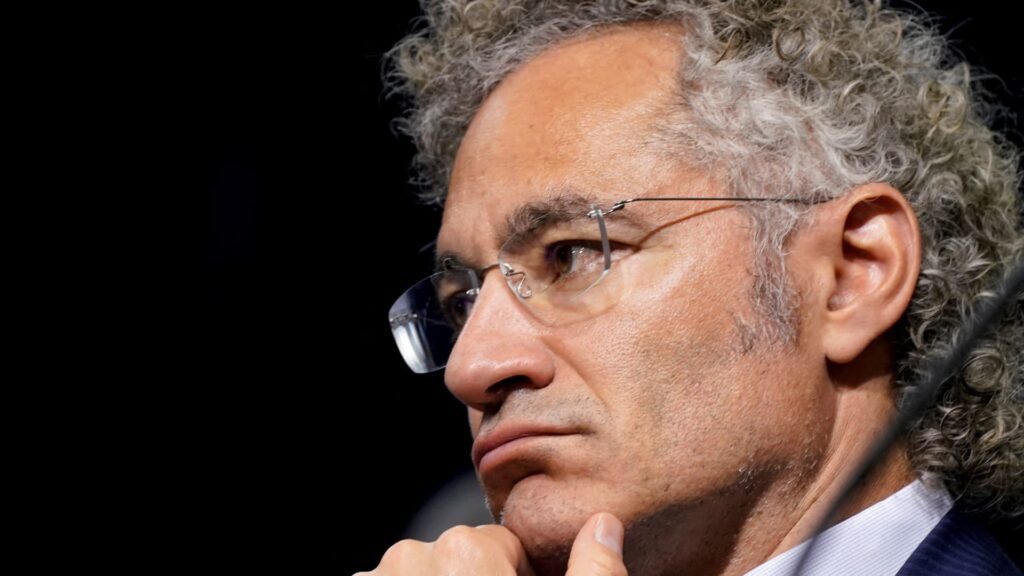CEO of Palantir Technologies Alex Karp attends the Pennsylvania Energy and Innovation Summit, at Carnegie Mellon University in Pittsburgh, Pennsylvania, U.S., July 15, 2025.
Nathan Howard | Reuters
It’s been a tough November for Palantir.
Shares of the software analytics provider dropped 16% for their worst month since August 2023 as investors dumped AI stocks due to valuation fears. Meanwhile, famed investor Michael Burry doubled down on the artificial intelligence trade and bet against the company.
Palantir started November off on a high note.
The Denver-based company topped Wall Street’s third-quarter earnings and revenue expectations. Palantir also posted its second-straight $1 billion revenue quarter, but high valuation concerns contributed to a post-print selloff.
In a note to clients, Jefferies analysts called Palantir’s valuation “extreme” and argued investors would find better risk-reward in AI names such as Microsoft and Snowflake. Analysts at RBC Capital Markets raised concerns about the company’s “increasingly concentrated growth profile,” while Deutsche Bank called the valuation “very difficult to wrap our heads around.”
Adding fuel to the post-earnings selloff was the revelation that Burry is betting against Palantir and AI chipmaker Nvidia. Burry, who is widely known for predicting the housing crisis that occurred in 2008 and the portrayal of him in the film “The Big Short,” later accused hyperscalers of artificially boosting earnings.
Palantir CEO Alex Karp vocally hit the front lines, appearing twice in one week on CNBC, where he accused Burry of “market manipulation” and called the investor’s actions “egregious.”
“The idea that chips and ontology is what you want to short is bats— crazy,” Karp told CNBC’s “Squawk Box.”
Despite the vicious selloff, Palantir has notched some deal wins this month. That included a multiyear contract with consulting firm PwC to speed up AI adoption in the U.K. and a deal with aircraft engine maintenance company FTAI.
But those announcements did little to shake off valuation worries that have haunted all AI-tied companies in November.
Across the board, investors have viciously ditched the high-priced group, citing fears of stretched valuations and a bubble.
In November, Nvidia pulled back more than 12%, while Microsoft and Amazon dropped about 5% each. Quantum computing names such as Rigetti Computing and D-Wave Quantum have shed more than a third of their value.
Apple and Alphabet were the only Magnificent 7 stocks to end the month with gains.
Sill, questions linger over Palantir’s valuation, and those worries aren’t a new concern.
Even after its steep price drop, the company’s stock trades at 233 times forward earnings. By comparison, Nvidia and Alphabet traded at about 38 times and 30 times, respectively, at Friday’s close.
Karp, who has long defended the company, didn’t miss an opportunity to clap back at his critics, arguing in a letter to shareholders that the company is making it feasible for everyday investors to attain rates of return once “limited to the most successful venture capitalists in Palo Alto.”
“Please turn on the conventional television and see how unhappy those that didn’t invest in us are,” Karp said during an earnings call. “Enjoy, get some popcorn. They’re crying. We are every day making this company better, and we’re doing it for this nation, for allied countries.”
Palantir declined to comment for this story.
WATCH: Palantir CEO Alex Karp: We’ve printed venture results for the average American

https://www.cnbc.com/2025/11/28/palantir-ai-selloff-worst-month.html


